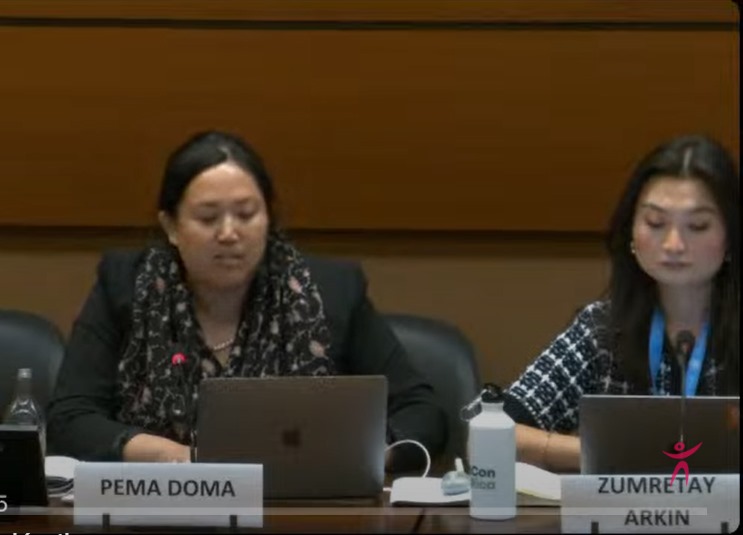- info@ghrd.org
- Mon-Fri: 10.00am - 06:00pm
HRC 54: Human Rights in China: Ongoing Human Rights Violations Against Uyghurs and Tibetans

HRC 54: Human Rights in China: Ongoing Human Rights Violations Against Uyghurs and Tibetans
Photo Source: International Service for Human Rights Youtube Channel
30-09-2023
Topic: United Nations
Region: Asia
Roza Cseby
Team UN Geneva Researcher,
Global Human Rights Defence.
On September 28th, an interactive side event on the human rights situation in China was held by the Society for Threatened Peoples at the United Nations Office in Geneva. The panellists of the event were Pema Doma, the international campaign director of the Students for a Free Tibet (SFT), Zumretay Arkin who is the chair of the Women’s Committee at the World Uyghur Congress (WUC), Linda Wong, a lawyer from Hong Kong, and Faye Chen a Chinese human rights defender and activist. The discussion was built around the CEDAW’s (UN Committee on the Elimination of Discrimination Against Women) Concluding Observations on China and Hong Kong covering the period from 2014 to 2023.
Pooja Patel, Programme Director at International Service for Human Rights, moderated the event and opened the discussion by underscoring the increased reprisals on human rights defenders and civil society actors and organisations in China. She stated that it is the direct consequence of the growing phenomenon of government-organised NGOs (GONGOs) in China who were the majority of NGOs submitting reports to CEDAW and consequently, affecting the impartiality of the CEDAW report by echoing the Chinese government’s position in detail.
Zumretay Arkin emphasised the situation of hundreds of Uyghur women (scholars, cultural figures and ordinary people) who were subject to re-education through so-called ‘vocational training centres’. She stated that “China is engaging in a systematic campaign to eradicate Uyghurs’ culture, religion, and language.” With her colleagues, she spoke to many former detainees who reported different forms of physical and mental abuse, including sexual violence, rape, and forced sterilisation inside these ‘training’ camps. She further emphasised the lack of ability of Uyghur women to make autonomous decisions in the context of family life. There have been increased efforts by the authorities to force the marriage of Han men and Uyghur women. However, not just women’s rights, but children’s rights are at risk in the Xinjiang Uyghur Autonomous Region. Older children are separated from their parents and sent to state boarding schools to be re-educated according to the government’s beliefs and principles, which causes serious erosion of the linguistic and cultural rights of the children.
Lastly, Zumretay Arkin stressed that the CEDAW Committee highlighted the coerced birth control policies on Uyghur women as the most alarming issue of all. Since 2015, the Chinese government has made efforts to reduce the birth rate of Uyghur women through coercive family planning. As a result, the birth rate among the Uyghur population fell from 2015 to 2018 by 84 percent in the two largest Uyghur prefectures.
Faye Chen pointed to the fact that although the CEDAW report expressed appreciation for the progress made since the last examination in terms of laws, such as the Civil Code amendment in 2020, establishing civil liability for sexual harassment, or the Anti-Domestic Violence Law in 2015 which prohibits all forms of domestic violence, the Committee consistently raised concerns about the lack of data which hinder follow-up processes and measures to know whether these laws have actually improved women’s lives.
Pema Doma provided a brief summary of the many issues the CEDAW raised in its report concerning the human rights of Tibetan women, including their access to justice, trafficking, the confiscation of their passports, residential boarding school, linguistic rights, and employment and labour transfer concerns. Forced education is a primary concern of the CEDAW regarding Tibetan girls’ rights. Currently, over one million Tibetan children between the ages of four and eighteen, which makes up 80 percent of their entire population, are separated from their families in government-run boarding schools. Moreover, children are required to study Mandarin in these schools, and they are not allowed to practise their religion and they are subjected to a highly politicised curriculum. She concluded her summary by questioning “how can the rights of Tibetan women and girls be protected when there are currently 25 outstanding requests by special procedures to visit China [pending for 15 years]”?
The event ended with statements and questions from the delegations of the EU and the United States. They asked about the impacts of activities of human rights bodies and special procedures on the human rights situation and about the possible further steps to ensure that more civil society NGOs participate in future CEDAW reviews. Zumretay Arkin noted with regret that no significant changes have happened, as detention and repression are still a big concern in China. Thus, she urged Member States to take greater action in guaranteeing the safety of human rights defenders and organisations, as well as holding the perpetrators accountable for their actions. The international community must increase the pressure on China to realise the human rights of all its citizens.
Sources and further readings:
International Service for Human Rights (28 September 2023). #HRC54: Findings of the UN women’s rights committee on China: perspectives of affected communities. Retrieved on 30 September 2023 from https://www.youtube.com/watch?v=DXoFbkcX_Tc&list=PLdexkKNXSQRlEj3Hb5nYmeC_QMT0q6S3l&index=5
Search
Causes
ABOUT US
Global Human Rights Defence (GHRD) is a dedicated advocate for human rights worldwide. Based in The Hague, the city of peace and justice. We work tirelessly to promote and protect the fundamental rights of individuals and communities. Our mission is to create a more just and equitable world, where every person's dignity and freedoms are upheld. Join us in our journey towards a brighter future for all.
ALL CONTACTS
-
Riviervismarkt 5-unit 2.07
2513 AM The Hague - Phone +31 62 72 41006
- info@ghrd.org
-
10:00am - 06:00pm
Saturday & Sunday Closed
SUBSCRIBE
Stay informed and be part of change - Subscribe to our newsletter today!
- Copyright of GHRD 2023. Powered by Desmantle Studio.


Leave a Reply